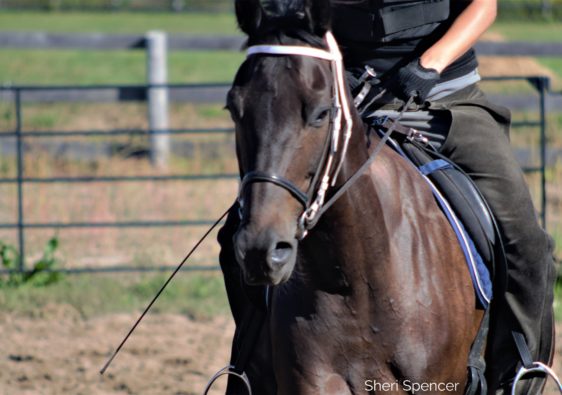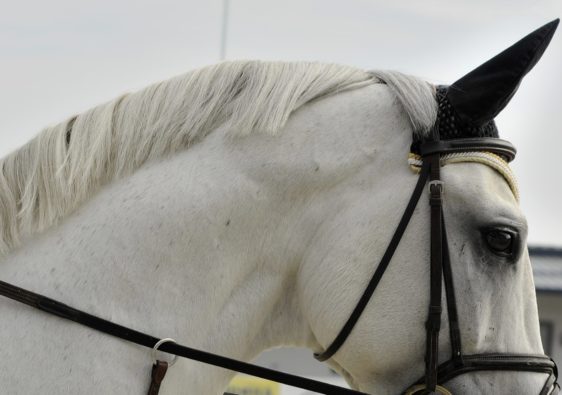You had a long day at work and just want to go for a ride and call it a day. When you arrive at the pasture gate, however, your horse takes one look at you and decides he’d rather not.
Normally, he greets you with pricked ears or at least stands there and lets you fetch him, but today he decides he’d rather hide behind his pasture mates or vamoose altogether.
Whether it’s a gradual slide into avoidance or becomes a “hit and miss” event, depending on the day, this could be your horse’s way of telling you something is amiss.
Here are the two most important things to consider if your horse has started to change his mind about coming in to be ridden:
1. Check yourself.
Horses are highly attuned creatures, and are able to pick up on emotional states before you even get out of your car. This is what makes them so great for equine assisted therapies. But it also means that they can see right through you, too. You can’t fake calm, even with a relaxed body posture. If you’re harbouring any tension or frustration from the day (or your horse’s avoidance tactics), they can tell, and some horses are especially sensitive and become uncomfortable to be around those kinds of strong energies, whether you’re knowingly sending them out or not.
What to do? Take a few deep breaths, and focus on your breath and on your body. While you breathe slowly, focus on your feet, first, and slowly move up your legs, through your seat and core, up into your shoulders, down your arms and into your head. As you move your point of focus through your body, relax anything and everything you don’t need to keep yourself standing upright. Imagine all the day’s stresses melt away, or breathe them out every time you exhale, whichever technique feels more natural. You don’t need to feel self-conscious about it, because no one else can see inside your mind. If they’re watching, they just see you standing there. No big deal. Only your horse can pick up on your techniques. And while he might not come to you immediately, he might decide it’s okay to let you go get him. It gets easier with practice, and should be utilized any time you feel yourself getting upset or frustrated. Whether it’s in the barn, under saddle, and even while you’re at work. Being able to detach from an emotional state and release stress is crucial for your long-term health and happiness. Now thank your horse for inspiring you to become conscious of it.
2. Add variety.
While it’s encouraged to be consistent in working towards new goals as riders, it’s also important to remember that your horse doesn’t look at them the same way you do. If you spend every ride practicing the same movements or doing the same courses in the same arena, he’s probably going to get bored. Variety will not only help round out his physical conditioning, but will also allow for mental breaks and fresh perspectives which are as important to your horse as they are to you. If he seems to really enjoy trail rides, turn a “light” day into a day for a hack. If he seems to thrive when his mind is kept busy, set up patterns with ground poles and cones and make it a “play” day, only asking for as much as he is comfortable giving. Maybe instead of riding one day, play with him in-hand instead, and spend time hand-grazing afterward to reinforce time with you as positive bonding time.
There is a quote from Arthur Helps which stuck with me, and it is as applicable for horses: Routine is not organization any more than paralysis is order.
Replace “organization” with “training” and that paralysis will happen to enthusiasm. As morbid as that may seem, there is something to it. It’s the same idea as eating the same food every day. Even if it’s your absolute favourite food in the world, it’ll be good for a while, but sooner or later you’re going to get sick of it. If you’re forced to eat it long enough, the very thought of it will ruin your appetite altogether.
When it comes to your horse’s willingness to come out and play, it may take a few rides for him to get the idea that instead of even more brussel sprouts, he’s going to get some chocolate cake and applie pie for a few days. If you’ve been stuck in the same routine for a while, make a point of giving your horse a little “vacation”, focusing on doing things that he really enjoys. See if his attitude about coming in to “work” starts to change.
As important as your goals are, you will only achieve them if your horse is as interested as you are.
There could very well be a lot of other factors including if your horse is in pain or has herd separation anxiety. It’s good to check them for back pain on a regular basis, and you can get some tips for that here. If you’re concerned it has more to do with separation anxiety from his herd, try asking an owner of a herdmate about riding with them, focusing on making positive experiences with you while in their company, so that weaning them off that dependence becomes easier.



